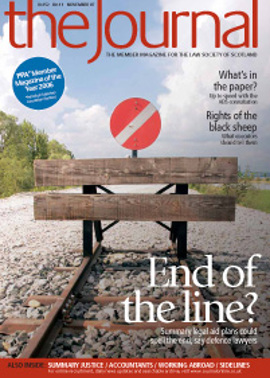Mediation innovation

The European Union currently has mediation in its sights as a way of improving the effective functioning of the internal market. Throughout the EU, solutions are being sought to the problems of rising court costs, ever increasing caseloads and pressures on court time. In a growing number of European countries, mediation is seen as a cost effective and efficient solution with high levels of acceptability for the parties to the dispute.
Some trial schemes
Some of the most interesting solutions are in relation to court-based mediation, which is proving very successful particularly in Portugal. As a result of the establishment of pre-trial mediation schemes using independent mediators in the magistrates’ courts, more than 50% of disputes are now resolved without recourse to court proceedings. Mediation chambers have been set up in the courts, and judges encourage parties towards mediation in appropriate cases. Thirty per cent of disputes referred are resolved, and the other 70% are often settled through conciliation. Special mediation centres for consumer and vehicle disputes now also exist throughout the country, and the government is creating country-wide mediation centres for commercial disputes.
Experiments in court-based mediation are also underway in Germany, where the presiding judge acts as the mediator pre-trial, using specially designed rooms in court which are less intimidating than court itself. A court-based mediation system has been in place since 2002, and 20% of all civil disputes now settle through mediation. Two thirds of those presented with the option agree to mediation, and 95 courts and 300 judges currently offer the service.
In France, online mediation is proving to be extremely successful in resolving internet-based disputes, with the state-funded Internet Rights Forum dealing with around 2,355 cases per year, of which 89% are resolved satisfactorily. The system applies to internet purchases and has been much used in disputes with internet service and telephony providers. The service is free and cases must be resolved within three months, which adds to the attraction of the system.
Similar enthusiasm?
In England & Wales, where family disputes benefit from public funding, there is an obligation to attend a compulsory information session on mediation, and as a result the use of mediation in divorce has grown exponentially since 2000 when the first pilot projects were created. Some 14,000 family disputes are now settled by mediation.
In Scotland, takeup of mediation by the public and by business has been slightly less enthusiastic. Over 70 solicitors are accredited as mediators by the Law Society of Scotland, a not inconsiderable number considering that a total of around 400 solicitors have some form of specialist accreditation. However levels of demand for their services are not high. One reason for this may be cultural – whilst court-based mediation has been a success in certain inquisitorial systems, perhaps it is less obviously attractive in an adversarial system. Another issue may be the lack of enforceability of mediation settlements and a reluctance based on the uncertainty inherent in the system – one of the parties may simply decide not to be bound by the settlement and go to court after all.
Draft directive
The EU sees mediation as a way of addressing the issues of delay and cost in the court process which potentially act as a barrier to the proper implementation of the internal market. To this end, a draft Directive on Mediation in Civil and Commercial Matters is under consideration at the moment, with the aim of encouraging member states to make mediation available on as wide a basis as possible. Whilst only applicable to cross-border mediation (a point of some contention during the debates to date), the directive may provide some impetus for increasing the takeup of mediation throughout the EU.
The draft addresses the question of minimum rules on the relationship between mediation and the legal process, in particular rules of civil procedure which may impact on the use of mediation. Not all member states have the same rules in place in this regard, and the draft directive deals with issues such as ensuring that settlement agreements can be rendered enforceable; ensuring that information obtained in the course of a mediation is not admissible in evidence in any future proceedings in the same case; and ensuring that limitation periods are suspended when mediation commences so that the parties’ subsequent right to go to court is not affected.
It also includes a provision that courts “may, when appropriate and having regard to all circumstances of the case, invite the parties to use mediation”. The interpretation of this is open to debate and whilst it is not intended to render mediation compulsory in any way, it may open the door to courts in Scotland, at least in cross-border cases, encouraging mediation as the way forward.
Lindsay Paterson is Acting Justice and Home Affairs Adviser at the Law Societies’ Joint Brussels Officea
In this issue
- The shape of your future
- The law and the forum
- End of the line?
- Summary justice: the big picture
- Now it's your turn
- Flying south
- Legal rights and the black sheep
- Mediation innovation
- Counting on your CA
- The risk of paper cuts
- Society hits the Net at Murrayfield
- Leading the charge
- Computer says no
- Who, what, where, when, why?
- Getting in on the Act
- Scottish Solicitors' Discipline Tribunal
- Website reviews
- Book reviews
- Well funded work
- PSG offers an offer






